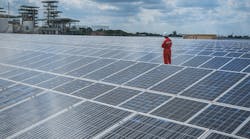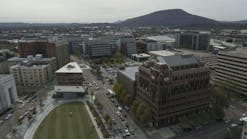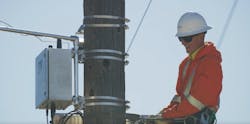"Climate Change 2022: Mitigation of Climate Change" provides a worldwide assessment of countries' efforts to meet their climate change commitments. It also noted a "disastrous" acceleration of global warming indicators, leading to a detrimental increase in temperatures by 2100, which would cause heat waves, floods, storms, water shortages, and a million species in extinction. With the heightened awareness of the considerable impact that non-renewable energy sources are deploying on the environment, the world is demanding rapid action and alternate options.
The vast expansion of renewable energy technologies is on track to reach new levels in the years to come. The falling cost of technologies has led to a myriad of opportunities for the industry. The economies of scale and aggressive supply chains create a situation where the more technologies that are deployed, the lower the cost, which in turn drives more deployment.
Onshore wind, solar, battery storage, and recently allowed offshore wind are gaining momentum without precedent. The US Energy Information Administration reported that 2019 renewable energy consumption in the United States surpassed coal consumption for the first time in 130 years. Further, the International Energy Agency reports that renewable energy experienced an unparalleled boom in 2020 with a 45% jump in capacity – its most considerable annual rate of increase since 1999 – and the US Energy Information Administration says wind, solar, and battery storage are set to account for a staggering 81% of all new capacity in 2021.
Renewables are becoming self-reinforcing and self-perpetuating, which aids in informed public debate, adoption, financing, and policy support. There are now 67,000 operational, utility-scale wind turbines situated on 1,500 wind farms and 2,500 utility-scale solar plants/farms in the United States. Considering all the success, there is a major labor shortage happening behind the scenes to keep these systems running smoothly and safely.
Virtually anywhere you look in today's world, there is some type of SCADA system running behind the scenes: maintaining the refrigeration systems at the local supermarket, ensuring production and safety at a refinery, achieving quality standards at a wastewater treatment plant, or even tracking your energy use at home. Renewable energies are no different.
Renewable energies use supervisory control and data acquisition (SCADA) systems to help operate sites. Supporting a labyrinth of alarms, sensors, and switches, utility SCADA links hardware and software components of a site to observe, manage, and evaluate performance. SCADA systems can regulate individual wind turbines and solar inverters with pause, stop, and start commands or control different components within each technology. However, the SCADA system's most remarkable abilities are remotely controlling the site for any safety concerns and managing the whole site by active power, reactive power, voltage, or frequency for maintaining power and stability on the grid.
SCADA Skills
One of the biggest threats to the renewable energy industry is falling behind competitively, which can happen if the workforce doesn't possess the skills in emerging automation technologies.
SCADA engineers require a combination of skills in numerous disciplines. They need proficiency in major SCADA applications, electrical system components, network architecture, emerging renewable technologies, and communication techniques to effectively monitor and control very large industrial processes. It is also essential to have knowledge of proprietary and/or industry-specific systems that are either showing their age with outdated communication protocols, are new technologies that are not fully understood by the parties they are integrating with, and where no standards have been developed. Power generation SCADA requires some electrical and mechanical knowledge, and renewables require specific knowledge around that industry for Wind, Solar, Geothermal, etc. For substation, integration SCADA involves an understanding of breakers, line protection, and other protection and control devices. Oil and Gas requires knowledge of fluids, pressures, and how the operations of pipelines work to control the different fluids being pushed through each pipeline.
Also of importance is understanding local, state, and federal regulations, which include Independent System Operator (ISO)s, Transmission System Operator (TSO)s, balancing authorities, and NERC and FERC regulations. IT and network skills are required for the systems to communicate seamlessly with one another, including cybersecurity knowledge are also needed to protect those systems from threats, as power plants are critical infrastructure. It is beneficial for SCADA operators to know about fiber optics, microwave radio, and LTE for the devices to transmit data and remote access. Deep insight into multiple types of PLCs, RTUs, sensors, SCADA software, HMIs, data concentrators, relays, and other mechanical devices is needed to provide a complete data set and control capabilities of each site.
Although companies and professional organizations offer SCADA training programs with certifications, many are not thorough enough to become a knowledgeable SCADA engineer. Currently, the only way to obtain these skills is through on-the-job training and working with others who have gained the knowledge through years of work experience.
In-House or Outsource
Renewable energy organizations typically require SCADA engineers to have a bachelor's degree in a related field, such as Electrical Engineering, Computer Science, or IT. They also like their candidates to have at least four years of relevant, progressive, technical work experience and demonstrate exemplary computer and communication skills. T With a lack of candidates that have the experience, companies choose new hires with one or two major skillsets and then provide on-the-job training to round out skills and knowledge. It's a slow, formidable process.
In addressing the burgeoning skills gap and lack of qualified talent, many renewable companies are leveraging third-party SCADA/IT staff augmentation and/or moving to third-party control rooms. They are reliable options for renewable energy companies looking for cost savings that leverage SCADA and control room expertise in an enterprise-level infrastructure.
There are several specialized renewables SCADA and IT service organizations with experience supporting some of the largest global renewables projects. These service organizations can be utilized to meet or accelerate project timelines and fill in any technical skills gaps without the hassle of staffing an internal team to meet resource demand spikes. Once a project is commissioned, these resources can be shifted off the payroll or kept for routine maintenance and support. Given the industry's rush to meet renewables demand, any contract resource must be thoroughly vetted for expertise and a successful project track record.
Similar vetting is required for control room services. All third-party control rooms might look identical on the surface, but several significant and intricate factors should be considered when searching for the ideal host, many of which can have a major impact on overall cost and operational performance. The ideal third-party control room candidate must achieve a myriad of requirements and designations, many of which are necessitated by the significance of the industry but also by the severity of incident-causing oversights. Handing over the responsibility of control room management means the third-party candidate must be prepared to succeed in every territory of control room operations.
Due to the variable nature of daily operations, control room personnel must understand procedures unique to particular processes and industry-wide best practices and compliance requirements. The need for experience does not stop at the console. Ideal candidates for outsourcing control room operations provide expertise across the board for control room services, including experience with SCADA systems, IT infrastructure, and other supporting systems, to cover all facets of the interconnectedness of control room operations. This experience must cast a wide net encompassing industry knowledge to ensure that the candidate is not only experienced in the industry's past but invested in learning and preparing for the industry's technological future.
Experience with normal operations is the baseline for running a console. Still, the necessity for advanced experience comes with abnormal operating conditions that require an immediate diagnosis, irregular operations that threaten the safety of a high-consequence area, and disaster response when unforeseen weather wreaks havoc on a system. Experienced controllers are trained to address anomalies.
Conclusion
Third-party control rooms address the tremendous costs and skills gaps of internal control room operations head-on. They are a practical option for organizations of all sizes, and the "right" control room can provide progressive industry experience in management and controllers. Third-party expertise brings enterprise-level and highly-available infrastructure to tackle technological demand, interpret rolling regulations and ensure compliance, and create comprehensive disaster recovery plans to prepare for and avoid any situation that could cause downtime. By considering these aspects of control room processes, the renewable energy industry can confidently determine which third-party control room providers are best suited for managing their operations safely.
Author:
Woodrow Boles, Jr. currently serves as the Director of Renewables SCADA for EverLine, a fully-integrated compliance, SCADA/IT, control room, and security services company. In his current role, he is responsible for all interactions with companies that have current renewable assets or plan to add renewables to their portfolio, leading their SCADA integration into one of the largest, fully NERC compliant 3rd party control centers.
Woodrow has a Bachelor of Science in Computer Engineering from the University of Nevada, Reno. He has over 13 years of Renewable Energy industry experience, working with some of the world's largest owners of Wind, Solar, and Battery systems. Woodrow started in the Renewable industry by erecting wind turbines, moved into the maintenance of wind turbines and major component swap out, and settled in the engineering and design of SCADA systems. He has integrated nearly 10 GWs of Renewable Energy, working with OEMs, owners, offtakers, substation and 3rd party subcontractors across most of the ISO regions of North America.


